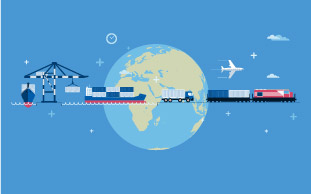Why are transportation and logistics employees losing two days of productivity per month?

SOTI has released its global report Mobilising the Delivery Workforce: State of Mobility in Transportation and Logistics 2021 Report.
An increase in e-commerce sales of up to 27.6% in the last year is causing transportation and logistics (T&L) companies tremendous strain as they work to fulfil a surge in orders due to the global pandemic. To scale their businesses and deal with changing consumer and business behaviours, a new global research report by mobile and IoT management solutions provider, SOTI, found that 74% of T&L companies had already begun to invest in mobile technology, wearables and IoT solutions in 2020. A significant 80% plan to continue to invest in mobile technology throughout 2021.
The Mobilising the Delivery Workforce: State of Mobility in Transportation and Logistics 2021 Report interviewed 550 IT decision-makers in the T&L industry across eight countries (UK, U.S., Canada, Mexico, Germany, France, Sweden and Australia), to understand the trends and solutions that are driving their organisations and how the pandemic affected operations.
Legacy Systems Not Integrated with New Investments Continue to Hinder Success and Result in Employees Losing Two Days of Work Per Month Due to Mobile Device Downtime
Despite this widespread investment in technology from T&L companies in 2020 and 2021, SOTI’s research indicated that this investment was not delivering the desired outcomes, with respondents suggesting that a lack of integration with existing systems is limiting productivity, creating siloed workflows and ultimately causing workers to lose valuable time when out in the field.
The delay due to mobile device downtime has led to 98% of global employees losing valuable work hours. Nearly one-third (32%) state the main cause of downtime causing shipping delays is the lack of IT support to address mobile device downtime issues. On average, organisations are losing 3.3 hours per employee each working week dealing with technical or system difficulties, with a global average of 14 hours lost per employee per month (15 hours in the UK).
“The pandemic has put a spotlight on the need for an integrated technology strategy,” said Sarah Edge, Director of Sales, UK and Ireland, SOTI. “While we are seeing a clear investment in technology from T&L companies, we are not seeing a cohesive strategy for the implementation and integration of new tech to counteract the repercussions of the pandemic. It is crucial for T&L decision-makers to understand that an absence of integrated devices and systems in their operations results in their organisations wasting time and leaving money and productivity on the table.”
Transportation and Logistics Companies Reliant on Pen and Paper Processes Making Errors
Once investments have been made, an even bigger cause of employee downtime is the lack of integration with existing systems. This creates inefficiencies, often causing employees to rely on paper-based processes and therefore paving the way for manual errors to occur. The following examples were more frequently cited:
- 45% say staff are updating multiple systems manually
- 31% say legacy tech is not fully integrated with new systems
- 29% say that information is not shared across all systems used
When asked about the issues causing downtime and delaying shipments, T&L employees cited the following:
- Updated information is not automatically shared across all the systems used (28%)
- There is a lack of staff training on the usage of technology (26%)
- Systems are not upgraded frequently enough (24%)
“There is a clear disconnect from the technology that T&L companies recognise they need, to the seamless adoption into their existing infrastructure,” continued Edge. “With an integrated mobile and IoT management platform, T&L companies are not only able to increase speed, but also minimise costs and ensure transparency in the delivery channel.”
READ MORE:
- Scaleup Spotlight: Plum is on a mission to build lifetime wealth for all
- The next generation of sound: Apple Music to rollout Spatial Audio with Dolby Atmos
- Scaleup Spotlight: How Light Science Technologies is revolutionising agriculture
- What can corporates learn from digital transformation in the COVID era?
Report Methodology
Commissioned by SOTI, Arlington Research, an independent market research agency, conducted 550 interviews using an online methodology among IT Managers, IT Directors, Senior Management and C-Suite (all disciplines) working in the T&L vertical across eight countries. All respondents are aged 18 and over and work in companies with 50 or more global employees. Fieldwork was conducted from March 18 to 30, 2021. The 550 interviews were split across eight markets as follows: US, Canada, Mexico, UK, Germany, France, Sweden and Australia.
For more news from Top Business Tech, don’t forget to subscribe to our daily bulletin!
